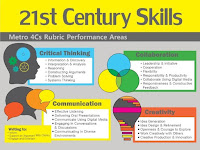As I sit here on a Saturday morning I am starting to think about the upcoming school year and I am getting excited. Yes excited. I know there will be some new wrinkles to deal with such as mask vs no mask, social distancing, etc. but I can see a little bit of normal coming back. That is not what is getting me excited. What is exciting me is a chance to re-engage kids with creating something from scratch, doing something using the skills they have as well as empowering them to learn new ones as well as honing my PBL skills.
I tested this out this summer after reading the book "What School Could Be" by Ted Dintersmith. I gave my two daughters a project to complete for me. After seeing them earlier in the year work on taking canvas shoes and painting designs on them I asked that they create something for me. One daughter I asked how much she would charge me to do a pair of Converse Chuck Taylor All Starts and the other I just asked to do it. The results were as I expected but really helped me see the power of doing PBL in the classroom.
How I approached this project is similar to how I could in my classroom and/or how I would approach an artist to do a work for me. I asked if they were interested and what they needed to get started. I worked out a draft design of what I wanted and gave it to both "artists". I then gave them the parameters (specs for you in an engineering class) of my project. They asked a few questions and then got going on the project. I did not give a timeline for the project and stressed I wanted it be something that was fun and enjoyable. I also told them that if they needed something (tool, skill, etc) to let me know so I could help.
The one who I told I would pay her for is dragging her feet and I can only think she is seeing it as a chore more than a project. However she is also starting her sophomore year in high school and other stresses of being 15 years old coming out of a pandemic. This is a good opportunity to try out some intrinsic motivation strategies as well as see how I can work with her on this project. Some may count this as a failure or an example of why PBL is not a good idea in the classroom. I see it vastly differently; I see it as an example of how grades can demotivate students.
The other one I didn't say I would pay her just that I wanted her to do a design on a pair of Van's Checkered Skate shoes. The main difference with her was I didn't tell her I would pay her for her services. What was interesting was as soon as I got the shoes in her hands she wanted to jump on creating them. She went through several mock-ups of designs as well as testing out paint colors for me. Once we agreed on the design and color she got to work. Watching her use painter's tape to block out the individual squares she was painting and marking end points etc. was fascinating to watch. All in all it took her less than a week to complete the project and the smile on her face when I first walked out the door with them on was all evidence I needed to know this was a success. And yes I did pay her for her services. For those interested here are photos of the completed shoes:
What I have learned through this simple application of PBL at home are:
- It is a great way to reinforce intrinsic motivation
- You don't need to have every part of the project mapped out ahead
- It is ok if you are not an expert on what kids are doing
- Failure is not always a bad thing
- Kids love to create things
- Due dates to mean on time delivery



















